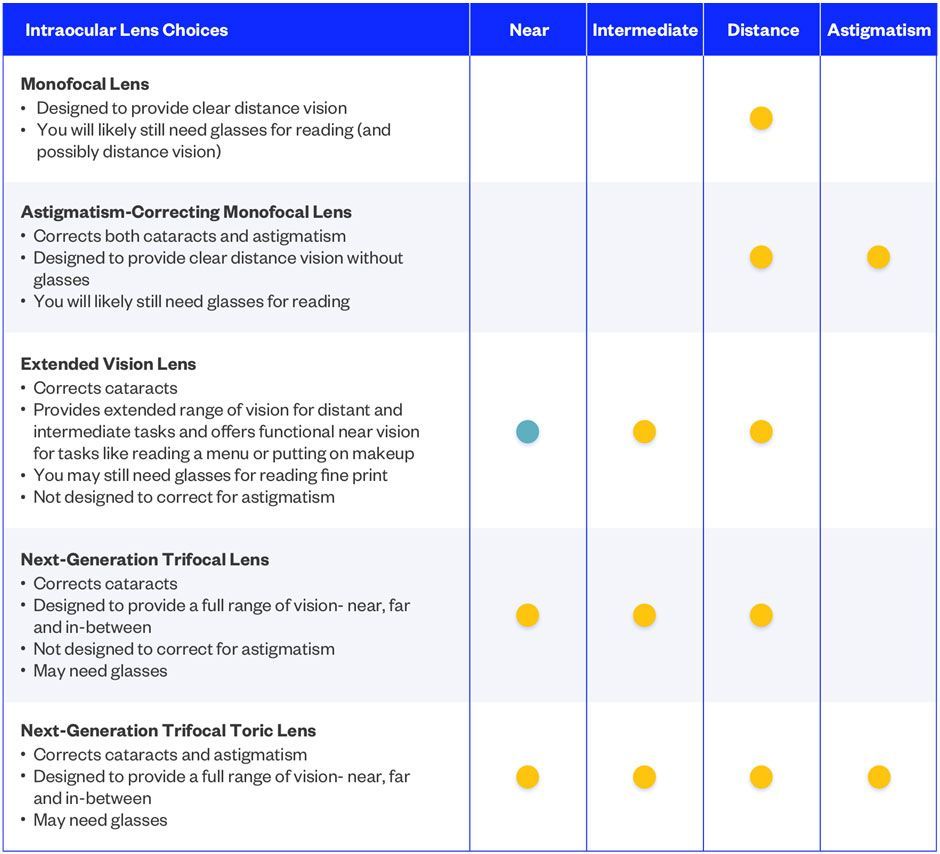Cataract Surgery and Advanced Technology Lenses
Insurance Accepted
24/7 Emergency Care
Free Glasses Adjustments
Hours:
What are Cataracts?
Cataracts are the condition of our natural lenses inside our eyes crystalizing and clouding over. It is typically a slow progression and the changes are subtle. Patients with cataracts have complaints of glare, blurred vision, and/or cloudy vision. They sometimes describe it as looking through a dirty windshield.
Cataracts are a normal condition that most people will have and will need Cataract surgery to remove them and greatly improve their vision.
How Do I Get Cataracts?
Cataracts happen naturally as we age. There isn’t anything we can do to prevent them from happening. Some things can accelerate the development of cataracts such as prolonged sun exposure without proper eye protection, trauma, genetics, and prolonged use of steroids.
What are the Symptoms of Cataracts?
- Cloudy or blurred vision
- Fading or dimming colors
- Sensitivity to bright lights and glare
- Difficulty seeing at night
- Needing brighter light to read
- Frequently changing vision prescriptions
- Halos around lights
- Double vision

Does Cataract Surgery Hurt?
No. There is no pain associated with Cataract surgery. You are under light sedation and most patients don’t remember the surgery at all. After the surgery, you may have some soreness, but no pain, and your vision will already be clearer! Cataract surgery is the safest surgery performed worldwide. An estimated 4 million cataract surgeries are performed every year in North America.
Do I Have Lens Options for My Surgery?
Yes! Technology has come a long way in the past few years, and now patients have a choice of lens implants and choices on how they want to see after the surgery. You can learn about the different lens options we offer here:

Monofocal Lenses
Also sometimes known as the traditional lens option, monofocal lenses are designed to correct vision at one focal point – often distance vision.
Toric Lenses
In some eyes, the surface of the cornea is oval-shaped rather than round, which scatters light across multiple focal points. This is called corneal astigmatism and can cause blurred or distorted vision. Toric lenses are designed to minimize the irregularities from the cornea and can also correct your astigmatism at the time of cataract surgery. Your eye doctor will advise if you require a toric lens. You may be a candidate for an extended vision toric lens or a trifocal toric lens. Choosing one of these advanced technology lenses will provide astigmatism correction along with vision correction options.
Multifocal Lenses (PanOptix)
Trifocal lenses are one of the latest advances in vision correction technology. They are designed to enhance your lifestyle by providing clear vision at near, intermediate, and far distances for clear, complete focus.
Cataract Solutions From an Eye Care Team You Can Trust
Kim Burrell, DO is a board-certified surgeon who has been practicing for over 30 years. She stays up to date on all the latest and greatest technology so she can help educate patients on their condition and treatment options.
We take our time measuring different parts of the eye and your vision during your pre-op, our belief is to measure twice, and operate once. Taking our time on the front end to ensure proper measurements, a healthy eye surface, and patient education ensures great visual outcomes for our patients.
Kim Burrell, DO is supported by her amazing staff who have been in the industry for many years and are well-educated in their field. Dr. Eric Van Meter examines our patients for both pre and post-operative care and provides Dr. Burrell with data she uses to determine which IOL (intraocular lenses) our patients qualify for and make the biggest impact on their life.
Our surgical coordinator will be with you every step of the way and will meet with you one on one to review all the surgical information, answer any questions and help guide you through the process. We do this every day, but for our patients, it’s a big deal and we are here to support our patients through the entire process.
YAG Capsulotomy After Cataract Surgery
After cataract surgery, patients can develop what is described as a film or cloudiness of vision. This is called posterior capsule opacification or PCO. This occurs when scar tissue builds up around the implant lens from cataract surgery. A yttrium aluminum garnet or YAG laser capsulotomy is a procedure that breaks up scar tissue quickly and painlessly. The body will naturally absorb the pieces of scar tissue, and vision will start to improve.
A PCO is common. The condition will develop in approximately 50% of patients after cataract surgery. There is no telling when or if a patient might develop a PCO, but it is easily treated without anesthesia, pain, or restrictions.
Are Cataracts Clouding Your Vision?
Call now to talk with our team about your cataracts with 24/7 emergency support available
(303) 699-3107
Centennial Eye Care is great! The staff, assistants and doctors are the best I’ve ever been to. Highly recommend them to anyone looking for eye care from yearly check ups to cataract surgery (Dr Burrell is awesome)!
- Tina Gosney
Do You Need YAG After Cataract Surgery?
Call now to see if YAG can help you after cataract surgery and let us work with your insurance provider
(303) 699-3107
I started seeing Dr. Burrell back in 2000 when she was starting her practice. I have had significant eye problems since I was a child, so it was great to have a doctor who was able to understand all my issues. In 2015 I had cataract surgery in both eyes and Dr. Burrell was outstanding. Those surgeries were life changing. In recent years I have also seen Dr. Van Meter and been very pleased with him as well. I experienced nothing but professionalism and kindness in my 24 years of visiting this office and have referred several of my friends there.
-Jana Collins



Share On: